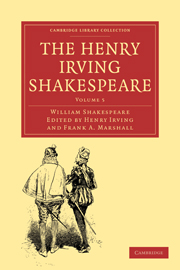3 - MEASURE FOR MEASURE
Published online by Cambridge University Press: 29 August 2010
Summary
INTRODUCTION
LITERARY HISTORY
Measure for Measure was first printed in the Folio of 1623. No external evidence as to its date has been found, and the internal evidence is both slight and doubtful. Tyrwhitt considered that two passages in the early part of the play contain an allusion to the demeanour of James I. on his entry into England at the time of his accession in 1603. In i. 1. 68–73 the Duke says:
I 'll privily away. I love the people,
But do not love to stage me to their eyes:
Though it do well, I do not relish well
Their loud applause and Aves vehement;
Nor do I think the man of safe discretion
That does affect it.
Again, in ii. 4. 24-30 it is observed by Angelo:
So play the foolish throngs with one that swoons;
Come all to help him, and so stop the air
By which he should revive: and even so
The general, subject to a well-wish'd king,
Quit their own part, and in obsequious fondness
Crowd to his presence, where their untaught love
Must needs appear offence.
“I cannot help thinking,” says Tyrwhitt, “that Shakspeare, in these two passages, intended to flatter the unkingly weakness of James the First, which made him so impatient of the crowds that flocked to see him, especially upon his first coming, that, as some historians say, he restrained them by a proclamation.” The Old-Spelling editors quote in their notes the following corroborative passage : “But our King coming through the North (Banquetting, and Feasting by the way) the applause of the people in so obsequious, and submissive a manner (still admiring Change) was checkt by an honest plain Scotsman (unused to such humble acclamations with a Prophetical expression; This people will spoyl a gud King.
- Type
- Chapter
- Information
- The Henry Irving Shakespeare , pp. 161 - 242Publisher: Cambridge University PressPrint publication year: 2009First published in: 1889

